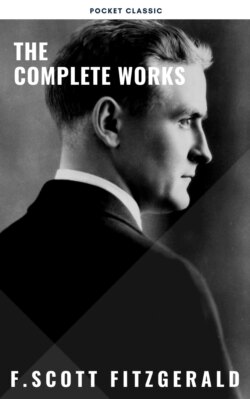Читать книгу The Complete Works of F. Scott Fitzgerald - F. Scott Fitzgerald - Страница 210
На сайте Литреса книга снята с продажи.
V
ОглавлениеWhen they located him and, after a personal expedition by one of the American vice consuls, got him out of jail, Milly realized how much these weeks had meant to her. The holiday was over. But even though Jim would be in Paris tomorrow, even though the dreary round of her life with him was due to recommence, Milly decided to take the trip to Château-Thierry just the same. She wanted a last few hours of happiness that she could always remember. She supposed they would return to New York—what chance Jim might have had of obtaining a position had vanished now that he was marked by a fortnight in a French prison.
The bus, as usual, was crowded. As they approached the little village of Château-Thierry, Bill Driscoll stood up in front with his megaphone and began to tell his clients how it had looked to him when his division went up to the line five years before.
“It was nine o’clock at night,” he said, “and we came out of a wood and there was the Western Front. I’d read about it for three years back in America, and here it was at last—it looked like the line of a forest fire at night except that fireworks were blazing up instead of grass. We relieved a French regiment in new trenches that weren’t three feet deep. At that, most of us were too excited to be scared until the top sergeant was blown to pieces with shrapnel about two o’clock in the morning. That made us think. Two days later we went over and the only reason I didn’t get hit was that I was shaking so much they couldn’t aim at me.”
The listeners laughed and Milly felt a faint thrill of pride. Jim hadn’t been scared—she’d heard him say so, many times. All he’d thought about was doing a little more than his duty. When others were in the comparative safety of the trenches he had gone into no-man’s land alone.
After lunch in the village the party walked over the battlefield, changed now into a peaceful undulating valley of graves. Milly was glad she had come—the sense of rest after a struggle soothed her. Perhaps after the bleak future, her life might be quiet as this peaceful land. Perhaps Jim would change someday. If he had risen once to such a height of courage there must be something deep inside him that was worth while, that would make him try once more.
Just before it was time to start home Driscoll, who had hardly spoken to her all day, suddenly beckoned her aside.
“I want to talk to you for the last time,” he said.
The last time— Milly felt a flutter of unexpected pain. Was tomorrow so near?
“I’m going to say what’s in my mind,” he said, “and please don’t be angry. I love you, and you know it; but what I’m going to say isn’t because of that—it’s because I want you to be happy.”
Milly nodded. She was afraid she was going to cry.
“I don’t think your husband’s any good,” he said.
She looked up.
“You don’t know him,” she exclaimed quickly. “You can’t judge.”
“I can judge from what he did to you. I think this shell-shock business is all a plain lie. And what does it matter what he did five years ago?”
“It matters to me,” cried Milly. She felt herself growing a little angry. “You can’t take that away from him. He acted brave.” Driscoll nodded.
“That’s true. But other men were brave.”
“You weren’t,” she said scornfully. “You just said you were scared to death—and when you said it all the people laughed. Well, nobody laughed at Jim—they gave him a medal because he wasn’t afraid.”
When Milly had said this she was sorry, but it was too late now. At his next words she leaned forward in surprise.
“That was a lie too,” said Bill Driscoll slowly. “I told it because I wanted them to laugh. I wasn’t even in the attack.”
He stared silently down the hill.
“Well then,” said Milly contemptuously, “how can you sit here and say things about my husband when—when you didn’t even—”
“It was only a professional lie,” he said impatiently. “I happened to be wounded the night before.”
He stood up suddenly.
“There’s no use,” he said. “I seem to have made you hate me, and that’s the end. There’s no use saying any more.”
He stared down the hill with haunted eyes.
“I shouldn’t have talked to you here,” he cried. “There’s no luck here for me. Once before I lost something I wanted, not a hundred yards from this hill. And now I’ve lost you.”
“What was it you lost,” demanded Milly bitterly. “Another girl?”
“There’s never been any other girl but you.”
“What was it then?”
He hesitated.
“I told you I was wounded,” he said. “I was. For two months I didn’t know I was alive. But the worst of it was that some dirty sneak thief had been through my pockets, and I guess he got the credit for a copy of German orders that I’d just brought in. He took a gold watch too. I’d pinched them both off the body of a German officer out between the lines.”
Mr. and Mrs. William Driscoll were married the following spring and started off on their honeymoon in a car that was much larger than the King of England’s. There were two dozen vacant places in it, so they gave many rides to tired pedestrians along the white poplar-lined roads of France. The wayfarers, however, always sat in the back seat as the conversation in front was not for profane ears. The tour progressed through Lyons, Avignon, Bordeaux, and smaller places not in the guidebook.
— ◆ —
